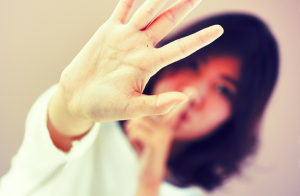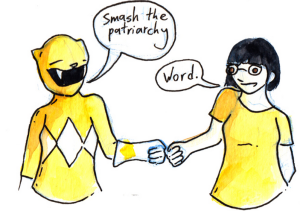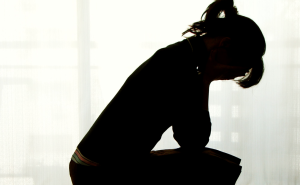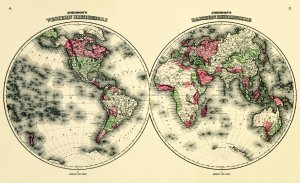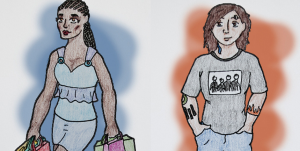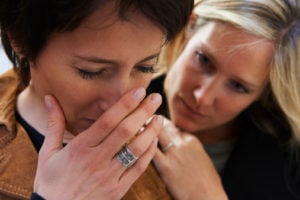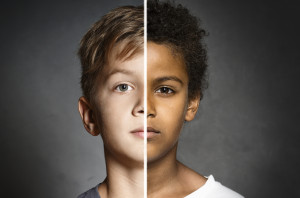Originally published on Medium and republished here with the author’s permission.
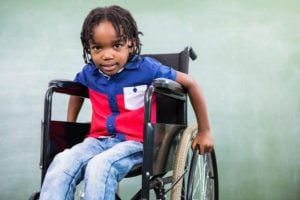
A child sitting in a wheelchair, leaning forward to hold onto the wheels, against a green chalkboard.
It’s interesting that this CNN article on body autonomy should show up when I wanted to talk about dysphoria and my experiences with it, because it got me thinking about attitudes toward the body and what it means to have control over your own body.
There’s something to be discussed when it comes to the relationship a lot of trans people have with their bodies, but, concerning this specific article, I want to talk about body autonomy and disability.
I agree with the CNN piece on this: Children should be taught body autonomy from a young age so that they understand and set healthy boundaries. My concern is how body autonomy applies to some children with disabilities.
Growing up, my body was not my own. I was a withdrawn kid and I tended to keep to myself, but hugs and kisses were a regular part of relating to family and children. While I wasn’t necessarily forced to hug and kiss relatives in the same way many children are, my mother’s family has always been very talkative and huggy, something that has always been a struggle for me, even as an adult. The struggle stems from a lot of things, including being on the autistic spectrum.
Physical touch has always been partially an issue of sensitivity for me. I have a hard time touching or wanting to be touched by people I’m not used to. Even hugging and kissing family members, whom I rarely saw, was and remains awkward for me.
Yet, it is hard to disclose that to folks without getting one of two reactions: either infantilizing you and treating like you’ll throw a fit if you handle the most minute of touches, or ridiculing your request and bullying you because of it.
I’ve experienced this as a child and most recently as an adult when I tried to discuss a touch before consent rule in a community organizing a polyamorous convention. Rules that acknowledge bodily autonomy handle that well. It doesn’t make a point of emphasizing my own sensitivity to touch, and acknowledges that everyone deserves this autonomy.
In fact, it would have been great as a little kid struggling to understand why I’d jump when touched.
Consent and Unwanted Treatment
Yet it would not have always worked, in some cases of children with disabilities. My mother could have tried to teach me that I had to give anyone consent before touching me, but unfortunately the reality of my disorder meant that people did have to touch me without consent.
My disorder requires regular blood draws, full body X-Rays, and physical examinations that I absolutely despised as a child. I’ve kicked nurses in the face, screamed while being strapped down to a board so they could get a full body X-Ray, and spent arduous hours in MRIs and CAT scans trying to do anything but be connected to my own body and what was happening to me.
Now, as an adult, I have learned to deal with regular blood draws without physically assaulting anyone, but the lingering effects of what I had to endure still stick with me. While I can get tattoos and piercings that actually hurt far more than blood draws do without any issue at all, the moment I see a butterfly needle and a tourniquet I start the disassociation process. I’m to the point where I can have blood taken without crying, but it’s difficult – and there’s nothing consensual about it.
While not trying to delegitimise my own problems, there are children and adults with disabilities who have far less ability to choose when someone gets to touch their bodies. People who need caregivers and assistance often don’t have the freedom or privilege to deny anyone access to their bodies. I can’t speak for all people with disabilities, but disability in my life has made consent a difficult and complex thing.
I consent now more than I did when I was a child to my health being improved, but I don’t consent to the pain and the memories of what I’ve gone through. Teaching bodily autonomy to children with disabilities may help them in a lot of ways, but the lesson has to be amended or modified. Because once a doctor or a professional is allowed to touch their body without consent, it negates what I think the purpose of teaching bodily autonomy is.
Sexual Abuse and Body Autonomy
I am also a survivor of sexual abuse. While I can’t say whether being a disabled child had anything to do with why I experienced what I have, I know that the power of authority figures was something my abusers took full advantage of. It’s hard for me to say if I was chosen because I was always an obedient child (and I’m really not exaggerating) who did whatever adults told me to do, or if I became an obedient child because of my abuse.
Independent of that, I had to be an obedient child because of my disability. Even when my family life got rough and I considered running away, I was always bound by the fact that I needed my medicine and couldn’t give it to myself. Even if I was taught body autonomy, there would have been an exception for adults who knew what was best for me, and that would have been taken advantage of, or I might even have been chosen over other children who didn’t have to make that exception.
I don’t really know what the solution is to this. On a wider scale, people with disabilities are still fighting for body autonomy from doctors and gatekeepers who have more control over our bodies than we do. All I know is that I want parents who teach body autonomy to understand what that means for children with disabilities.
It’s hard for me to quantify the reasons why my abusers got away with what they did, and if lessons on bodily autonomy would have necessarily stopped the abuse, or helped. It’s a good thing to teach your children and definitely supportive in some cases of disability, but I hope parents and individuals realize that it isn’t going to stop all cases of abuse and, whether you do have body autonomy or not, losing it to an abuser is never your fault.
[do_widget id=’text-101′]
Lola Phoenix is an agender aspie living London, hailing from the US South. When they’re not busy working, Lola enjoys writing original fiction (writing projects found @AlastorPhoenix), writing fanfiction, watching the same films and TV shows again and again, and bugging people to donate to their surgery fundraiser.
Search our 3000+ articles!
Read our articles about:
Our online racial justice training
Used by hundreds of universities, non-profits, and businesses.
Click to learn more





